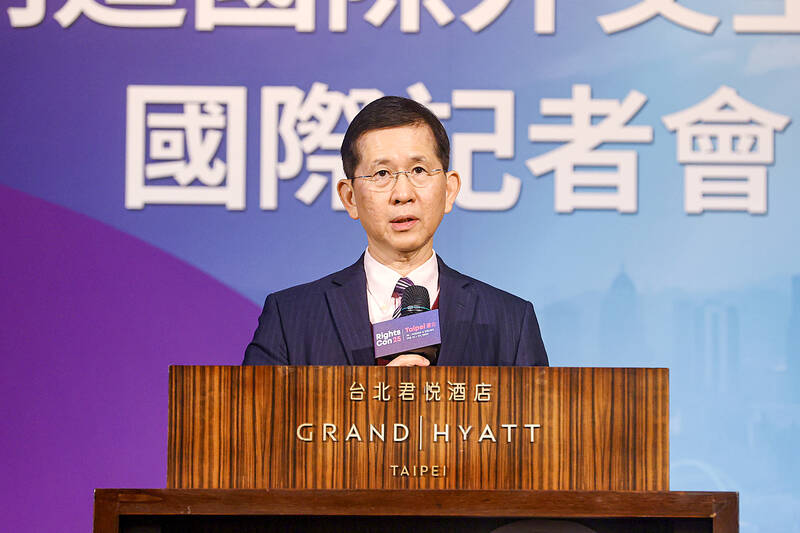Taiwan would pursue alternatives that are expected to become operational in the next two to three years to replace Space Exploration Technologies Corp and OneWeb telecommunication satellites should a change become necessary, Minister of Digital Affairs Huang Yen-nun (黃彥男) said yesterday.
Huang made the remarks in an interview with Yahoo TV online talk show host Wang Shi-chi (王時齊), who asked if Taiwan’s dependence on foreign telecom satellite groups capable of shutting down service for geopolitical reasons undermined the goal of building a resilient telecom infrastructure.
Huang said that Elon Musk’s Starlink and the Eutelsat OneWeb currently dominate the low Earth orbit satellite constellation business.

Photo: CNA
Taiwan’s emergency telecom system utilizes the latter following official negotiations, he said.
However, Canadian companies and Amazon’s Project Kuiper are developing similar systems, which are likely to be operational in two to three years as investors pour funds into the sector, he said.
Taiwan Space Agency is also developing domestic satellite systems, he added.
The government is not putting all its eggs in one basket and the nation’s telecom infrastructure would utilize different auxiliary systems to boost bandwidth if the project goes according to plan, he said.
Asked about recent incidents of undersea cables linking Taiwan to its outlying islands and the world being severed, Huang said the high frequency of mishaps in the past three months was suspicious.
Chunghwa Telecom and the Ocean Affairs Council reacted quickly on Tuesday when the Taiwan-Penghu No. 3 cable was snapped, enabling the coast guard to detain the ship suspected of sabotage, he said.
As an island nation, Taiwan depends on undersea cables to communicate with the outside world, and the ministry is working to mitigate this vulnerability by increasing its repair capabilities and laying down more cables, he said.
The ministry is facilitating efforts to improve technology to allow cables to be buried deeper and plans to harden cable landing points, he said.
Taiwan proper can maintain its communications with Matsu, despite losing all two cables because they are in the microwave transmission range and nine satellite ground stations have been built since the incident, he said.
The main island, Penghu and Kinmen remain connected via the Taiwan-Penghu No. 2, Penghu-Kinmen No. 3 and Taiwan-Kinmen No. 2 cables, he said.
However, the massive budget cuts by the opposition-led legislature have severely impacted the ministry’s project to build 773 emergency satellite ground stations, as the funding would only allow for 195 to be operated and maintained, Huang said.
Meanwhile, the ban on public employees using DeepSeek was implemented after internal tests showed that the Chinese artificial intelligence (AI) app failed to meet cybersecurity standards, he said.
The government would not interfere with the public’s use of the Chinese AI without being granted the authority via legislation, Huang said.

CHANGING LANDSCAPE: Many of the part-time programs for educators were no longer needed, as many teachers obtain a graduate degree before joining the workforce, experts said Taiwanese universities this year canceled 86 programs, Ministry of Education data showed, with educators attributing the closures to the nation’s low birthrate as well as shifting trends. Fifty-three of the shuttered programs were part-time postgraduate degree programs, about 62 percent of the total, the most in the past five years, the data showed. National Taiwan Normal University (NTNU) discontinued the most part-time master’s programs, at 16: chemistry, life science, earth science, physics, fine arts, music, special education, health promotion and health education, educational psychology and counseling, education, design, Chinese as a second language, library and information sciences, mechatronics engineering, history, physical education

The Chinese military has boosted its capability to fight at a high tempo using the element of surprise and new technology, the Ministry of National Defense said in the Quadrennial Defense Review (QDR) published on Monday last week. The ministry highlighted Chinese People’s Liberation Army (PLA) developments showing significant changes in Beijing’s strategy for war on Taiwan. The PLA has made significant headway in building capabilities for all-weather, multi-domain intelligence, surveillance, operational control and a joint air-sea blockade against Taiwan’s lines of communication, it said. The PLA has also improved its capabilities in direct amphibious assault operations aimed at seizing strategically important beaches,

‘MALIGN PURPOSE’: Governments around the world conduct espionage operations, but China’s is different, as its ultimate goal is annexation, a think tank head said Taiwan is facing a growing existential threat from its own people spying for China, experts said, as the government seeks to toughen measures to stop Beijing’s infiltration efforts and deter Taiwanese turncoats. While Beijing and Taipei have been spying on each other for years, experts said that espionage posed a bigger threat to Taiwan due to the risk of a Chinese attack. Taiwan’s intelligence agency said China used “diverse channels and tactics” to infiltrate the nation’s military, government agencies and pro-China organizations. The main targets were retired and active members of the military, persuaded by money, blackmail or pro-China ideology to steal

DEADLOCK: As the commission is unable to forum a quorum to review license renewal applications, the channel operators are not at fault and can air past their license date The National Communications Commission (NCC) yesterday said that the Public Television Service (PTS) and 36 other television and radio broadcasters could continue airing, despite the commission’s inability to meet a quorum to review their license renewal applications. The licenses of PTS and the other channels are set to expire between this month and June. The National Communications Commission Organization Act (國家通訊傳播委員會組織法) stipulates that the commission must meet the mandated quorum of four to hold a valid meeting. The seven-member commission currently has only three commissioners. “We have informed the channel operators of the progress we have made in reviewing their license renewal applications, and